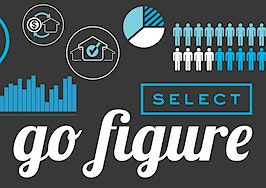For nine years, a specter has haunted the nation’s real estate economy and wreaked havoc with sales goals, inventories, refinancings and property values. Invisible to the naked eye, it strikes when least expected to slow down the recovery or turn someone’s American Dream into a nightmare.
Today this curse is a fraction of its original size. Its decline has tricked many into thinking that its threat has passed. Think again.
The housing depression created a new underclass of homeowners who cannot sell or refinance for two reasons. Because they owe more on their homes than they are worth. Or because they are above water but don’t have enough positive equity to cover the costs of selling or the 20 percent positive equity lenders require to refinance.
For most, their sad status is not their fault. They took out conventional mortgages at the peak of the bubble when everybody was buying a home, got caught in the crash and have been paying the price for nearly a decade. Their houses look old and worn because they lack the equity to remodel. Their children are saddled with student loan debt because their parents have no equity to tap to pay tuition. They pay 5.5 percent on their mortgages when everyone else has refied to 3.5 percent.
These are the under-equitied. They own about 10 million homes — about 20 percent of the 49.9 million homes with mortgages, according to CoreLogic’s latest equity report. That’s one out of every five homeowners with a mortgage.
The impact of the under-equitied on the housing economy is magnified because they are concentrated in certain markets. Those markets are the places that suffered most during the housing crisis — the so-called sand states of California, Arizona, Nevada and Florida. In these markets, prices fell further and created more under water and under-equitied owners than elsewhere. However, legions of under equitied can be still found in every market where buyers bought when values were higher than they are today. According to data from Homes.com, 60 percent of the nation’s top 300 markets have yet to return to peak values.
The under-equitied are more likely to fall in the mid- to low-price tiers. In fact, some homeowners trapped deep under water might essentially be in negative equity forever, according to research by Zillow’s Svenja Gudell. Homeowners at the bottom of the economic ladder are much more likely to own America’s least-expensive homes. Many of them are not only underwater, but deep underwater.
Over the past three years, we have been lulled to sleep by comforting headlines from reliable sources such as CoreLogic and RealtyTrac reporting that the numbers of underwater and under-equitied homeowners were steadily declining. The number of underwater homeowners increased in the fourth quarter of last year, but that’s not the real problem. The HARP program, now winding down, helped some 3.4 million, mostly under-equitied homeowners refinance. But HARP only helped the half of all mortgage holders whose mortgages were owned by Fannie or Freddie — all others were out of luck.
A time bomb is ticking. The average American homeowner moves every eight years — but not if they’re under-equitied. Boomers who bought before the bust are thinking of retirement, but they are still rattling around big houses they cannot afford to sell.
Families that long ago outgrew their homes not only can’t afford to move, they can’t afford to refi to add more space. Their houses are continuing to decay. Their children are paying tuition or saving for a down payment toward their first house without help from the bank of mom and dad.
Like ghosts in the night, the under-equitied play havoc with the balance between supply and demand. Wonder why there are many entry-level homes in your market? Are thin inventories driving up prices? Are inventories low because too many homes are owned by under-equitied folks who can’t sell?
There have always been under-equitied owners, and there always will be. The moment most new mortgages are signed, another under-equitied owner is born. Today’s silent scourge is on an entirely different scale. Its depressive effect will linger. It will linger until demand is strong enough to drive prices to levels that free the last prisoners who are serving a decade-long sentence. Or it will linger until the under-equitied pay down enough principal on their mortgages to free themselves.
Steve Cook is editor of Real Estate Economy Watch, which was recognized as one of the two best real estate news sites of 2011 by the National Association of Real Estate Editors. From 1999 to 2007 he was vice president of public affairs for the National Association of Realtors and continues to provide communications consulting services. In 2006 and 2007, he was named one of the 100 most influential people in real estate.







